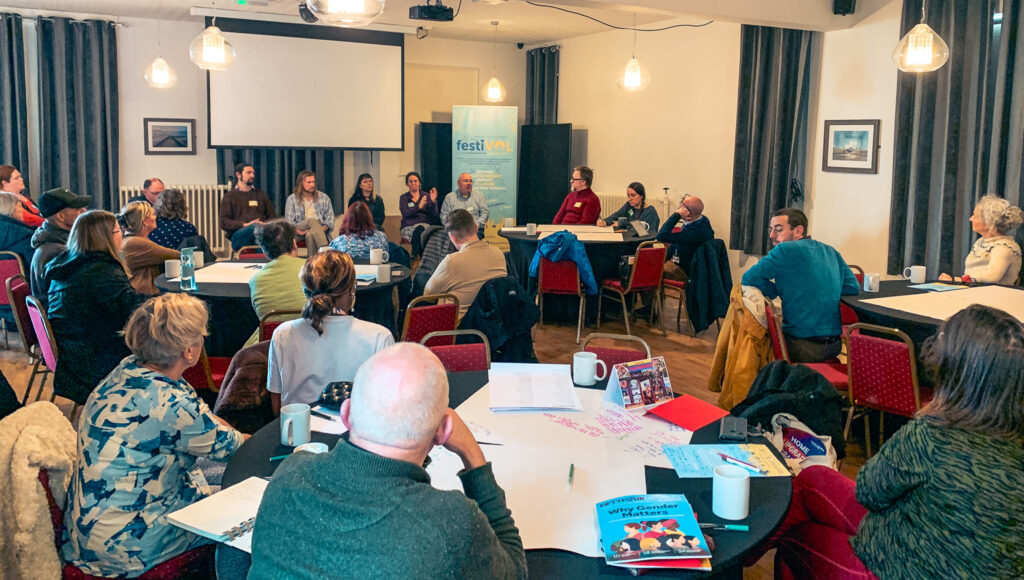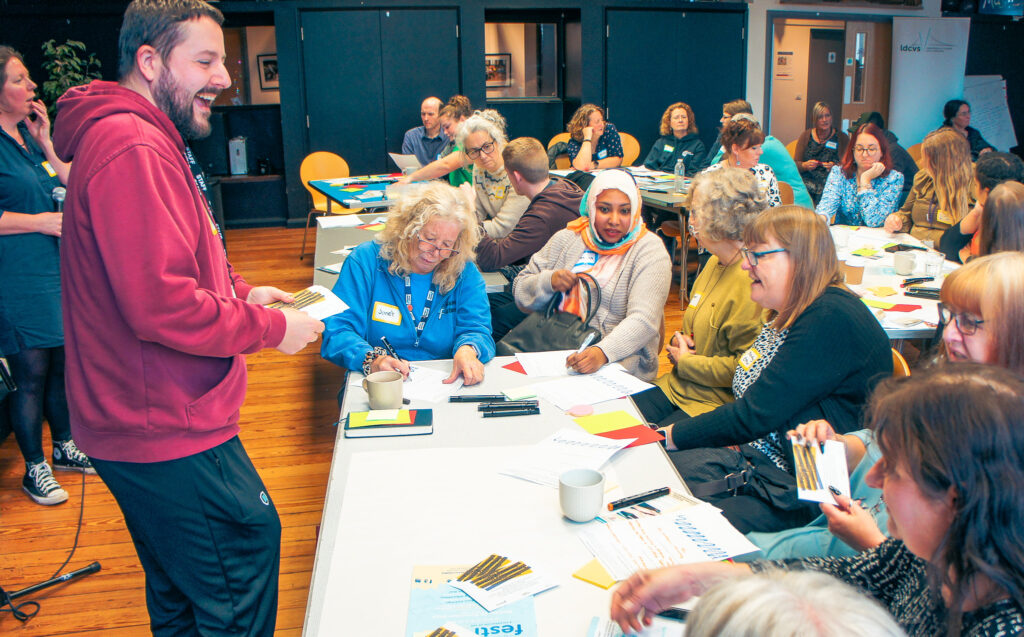FestiVOL 2023
Over one hundred representatives from dozens of community organisations met up at More Music in Morecambe on 21 November for FestiVOL, the annual celebration of our district's voluntary sector.
Opening the event, we heard inspiring accounts of community support, innovation and progress from guest speakers representing BEE Adventures, Positive Futures, Lancaster Men’s Hub, and Morecambe Bay Poverty Truth Commission. Delegates then took part in workshops taking a closer look at four areas where the involvement of community organisations has been changing and deepening across the district.
These workshops provided an opportunity for delegates to challenge preconceptions, share experiences and ambitions, and discover new ways to work together to support our communities. We also asked delegates to tell us, and each other, about their hopes for the next five years.
This process helps Lancaster District CVS understand how the organisations we support want to move forward in relation to acheiving their aims, and in turn contributes to our plans for the future and how we talk to stakeholders about our sector’s aspirations.
Volunteering in Arts & Culture
This lively discussion around volunteering in arts and culture included presentations from Matt Panesh of West End Players, Roy and Kath from King Street Arts, and Rachel and Jack from More Music.
Matt talked a little about his history, how he came to be in Morecambe, and the various projects and activities that he has been involved with, including Morecambe Fringe, Morecambe Poetry Festival, and Morecambe International Film Festival, and how these things would not have been possible without volunteers.
Matt asserted that everyone has a right to access local arts and culture activities, even if they simply turn their nose up at it and walk on by. Community arts and culture tells stories, and the people involved make it happen with or without funding.
Roy and Kath talked about King Street Arts and how they engage volunteers, giving vital experience to artists and other interested volunteers around planning and running exhibitions and shows. King Street Arts is all about the joy of arts, making the excellent point that you don’t have to be an artist to do art, you can just do art!
In conversation with Rachel, Jack told us about how volunteering in the arts with More Music has changed his life, given him confidence and new skills, and helped set him on the road to success. Rachel, too, talked about how the New Deal for artists and More Music’s band project changed her life. Jack found that through volunteering his skills became useful, in helping others, particularly young people, he has learned to teach music, and he has become ‘self actualised’.
In five years:
- There's the chance for the love of arts and culture to be sparked for every child
- Apprenticeships are available locally for interested young people - for example in acting or theatre/stagecraft
- Communities and young people use arts to grow in confidence after their pandemic experience
- Youth work, a traditional source of support for young people interested in arts, is better supported
- Community-based arts and culture organisations have better reach into our colleges and universities


Exploring Intergenerational Projects
Mandy Whitehouse, Committee Member from East Meets West was the first to speak at our Exploring Intergenerational Workshop. She introduced us all to the organisation and gave some background to how their “Across the Generations Project” came about. Born from one person’s desire to give back to the community, the project connects older people with refugees and asylum seekers via a befriending programme were relationships and friendships are built across ages and cultures. Initially funded by Lancashire County Council (training, DBS and social events costs), the project has gone from strength to strength and resulted in long lasting friendships.
Our next presenter, Sam Pritchard told us all about her local project in Halton, called Fighting Loneliness One Village at a Time. The concept is simple but incredibly effective, involving local people including children, creating handmade cards with an uplifting message for a stranger. The cards are then given to a nominated recipient with the intention of brightening their day. Every card is hand delivered by Sam, along with friendly doorstep conversation. There’s also a specific Christmas card and gift element, with 626 Christmas Cards and 260 gifts generously donated over the lifespan of the project to date.
Finally, Rachael Eastham and Charlie Brown showed us how art, creativity and especially music can be used to cross the generations. Their project was part of an action research project which took place at The Gregson Centre, working with various age groups to explore the deep connections we make using music and we also learnt that Donna Summer, “I Feel Love” has been sampled 75 times since it was first released!
The workshop was incredibly popular with 55 – 60 people joining us to listen to 3 very different projects, all of which explored ways in which we can bring people together across the generations to help reduce social isolation, improve health and wellbeing and be a catalyst for knowledge and skills exchange. Due to time constraints, we weren’t able to fully explore other current projects or plans for the future in any depth, although everyone agreed it is an area of work we could happily commit more time to discussing, utilising each other’s knowledge, ideas and creativity to develop this area of work for the Lancaster District.
Children & Young People's Projects
In this workshop, we were joined by Lou Andrews, Director of Client Services from CancerCare. It was inspirational to learn about the fabulous work that CancerCare are doing to support young people. We heard about programmes including Re-Fresh, which is a peer support group which provides fun, friendship and expert cancer support in a welcoming social setting. The programme is aimed at young people aged 12-17 years affected by cancer or bereavement at home.
Ant Briggs, Young People Participation Worker at LDCVS and Creative Producer for Lancashire Youth Challenge, demonstrated how impactful using play and curiosity can be in engaging young people. Ant had the group playing with balls, balloons and sticks which reminded us about the importance of having fun!
The group were asked to identify priorities to enable us to create a thriving young people’s sector. The next few years are looking very exciting – and also critical as we seek to embed partnership work across the sector through developing Lancaster District Young People’s Foundation with the voice of young people at its heart.
In five years:
- Young people are supported with independence and work skills
- Young people are empowered to share ideas, skills and showcase their successes
- Youth panels and young people funder meetings ensure young peoples' voices are heard, young people contribute to local authority priorities, and young people have opportunities to engage in activism and social action.
- Young carers, neurodivergent young people, and disabled young people are all properly supported
- There is investment in youth work and a properly funded young people's centre, and community organisations create more opportunities for collaboration including joint grant applications.
- Young people have opportunities for visibility, such as a regular young people festival or teenage takeover days.
The Power of Social Prescribing
We asked delegates to respond to the question:
What is your personal experience of being social prescribed? How did you feel before? How easy was it to undertake and how did it feel afterwards?
The responses confirmed how important social prescribing can be for EVERYONE but also how difficult it is for all of us.
How it felt before:
- I was lonely
- I was really nervous
Taking part:
- It’s sometimes difficult to motivate yourself to go
- It’s easy to cancel
- It was hard for the first few weeks
Afterwards:
- A lot more relaxed and able to meet my needs
- I feel like I’m with family
- Access to transport
- Knowledge of what is available
- Physical and mental health challenges
In five years:
Finally, we asked thinking ahead (up to 5 years) what would be the first thing you would want to do to effect a positive change in the world of social prescribing?
- Taster days – as a way of trying many different activities. It’s difficult to know what will make you feel better if you’ve never done it. Sign up for a whole course you don’t then like and it’s embarrassing to miss it.
- Increase funding, embed social prescribing into primary care core offer, funding from central government for 10+ years, then contract local organisations to delive
- Better education for GP staff. Their first step should be other areas instead of medication, if appropriate. Provide funding in line with medical services and promote public knowledge of social prescribing.
- Encourage cross-pollination, so that every organisation promotes other activities/services in the area going from scattered to joined up



